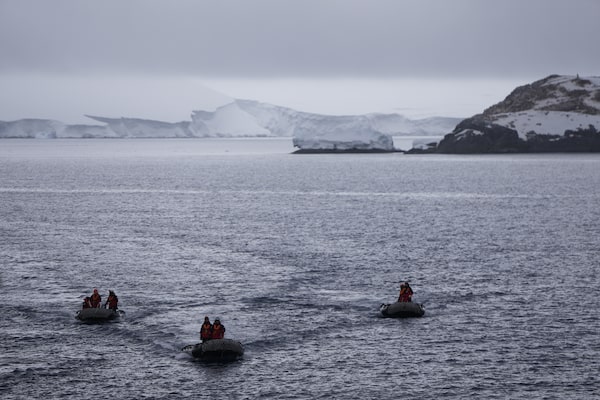
Zodiac boats sail in the Bransfield Strait towards the Bernardo O'Higgins Chilean military base in Antarctica, on Nov. 23.Jorge Saenz/The Associated Press
On the cusp of the COP28 climate talks, U.N. Secretary-General António Guterres visited frozen-but-rapidly melting Antarctica on Thursday and said intense action must be taken at the conference where countries will address their commitments to lowering emissions of planet-warming gases.
“We are witnessing an acceleration that is absolutely devastating,” Guterres said about the rate of ice melt in Antarctica, which is considered to be a “sleeping giant.”
“The Antarctic is waking up and the world must wake up,” he added.
Guterres is in a three-day official visit to Antarctica and Chile’s President Gabriel Boric joined him on an official visit to Chile´s Eduardo Frei Air Force Base at King George Island on the continent.
Guterres also was scheduled to visit the Collins and Nelson glaciers by boat.
He said that COP28 is an opportunity for nations to “decide the phase out of fossil fuels in an adequate time frame” in order to prevent the world from rising 1.5 degrees Celsius (2.7 degrees Fahrenheit) above pre-industrial temperatures. He said it also creates the opportunity for nations to commit to more renewable energy projects and improve energy efficiency of existing grids and technologies.
Warming air and ocean temperatures are causing Antarctic ice to melt. The frozen continent plays a significant role in regulating Earth’s climate because it reflects sunlight away and drives major ocean currents.
For years, scientists and environmentalists have kept an eye on the West Antarctic Ice Sheet as an important indicator of global warming. A study published in Nature Climate Change last month said warming has increased to the point that the ice sheet will now experience “unavoidable” melting regardless of how much the world reduces emissions of planet-warming gases like carbon dioxide. The study’s lead author, Kaitlin Naughten, estimated that melting ice in Antarctica’s most at-risk areas could raise global sea levels by about 1.8 meters (5.9 feet) over the next few centuries.
Another study published in Science Advances, also last month, reported that nearly 50 Antarctic ice shelves have shrunk by at least 30% since 1997 and 28 of those have lost more than half their ice in that short period of time.